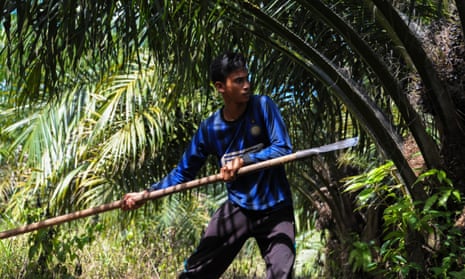The world’s leading body for the certification of sustainable palm oil has created new standards to tackle deforestation, human rights violations and greenhouse gas emissions on certified plantations.
The Roundtable on Sustainable Palm Oil (RSPO) published the RSPO Next standards on 9 February following rising pressure from industry and campaigners who claim that certified firms are still participating in deforestation, land-grabbing and the destruction of biodiversity, such as the loss of habitat for orangutans.
Created in 2004, the RSPO has led the push to create an accredited sustainable palm oil industry. Today it brings together 2,500 companies, from producers and traders to investors and retailers. Around 20% of the world’s palm oil is certified by the non-profit.

Palm oil is the most widely used vegetable oil in the world, according to WWF, and is found in an estimated 50% of supermarket products, from breakfast cereals to shampoo.
The spread of plantations used to produce palm oil, pulp and timber has largely been blamed for last year’s forest fires that engulfed vast areas of Indonesia. The resultant haze also affected Malaysia and Singapore, forcing schools to close and grounding flights. It is also thought to be behind up to half a million reported respiratory infections.
As global climate change targets become increasingly ambitious, pressure to preserve carbon-rich forests and soils is set to rise.
Major companies using palm oil are clamouring to demonstrate they are taking action, with some promoting initiatives they claim go beyond the standards originally established by the RSPO. Last year the Palm Oil Innovation Group – a small group of companies (including Danone and Ferrero) and NGOs that aim to build on the RSPO’s standards – published its charter calling for stronger action to tackle deforestation and human rights violations within the industry. The Sustainable Palm Manifesto, launched by a separate group, has focused on protecting high carbon forests.
RSPO Next
The RSPO has now responded with new, voluntary standards that ban planting on peatland and other carbon-rich soils, and require companies to implement fire prevention policies, reduce greenhouse gas emissions, pay employees a living wage and commit to zero deforestation.
Its pre-existing standards only ban the cutting of primary forests or those considered to be of high conservation value. They also ban the use of fire to clear land but, unlike RSPO Next, do not require companies to have procedures in place to prevent fire on land they manage. Furthermore, under the original RSPO requirements only extensive planting on peatland is discouraged and the reduction requirements for greenhouse gases are less comprehensive.
RSPO Next is, however, voluntary for members. The RSPO believes it would be impossible for some firms to implement the standards if they were compulsory.
While CEO Darrel Webber admits that there is likely to be some initial confusion, he is confident that if RSPO Next is successfully implemented by enough companies early on, it will be only a matter of time before it becomes the industry norm.
Andrew Jenkins, sustainability manager at Boots, part of the Retailers’ Palm Oil Group represented at the RSPO, fears RSPO Next will create a two-tier system that is inaccessible to smaller companies. “You don’t want to make it so complicated that only companies like ours that can afford to pay people like me to look at it can understand the system … If you’re going to change the market you’ve got to get everybody on the market, not just the big companies.”
Jenkins admits, however, that the RSPO has little alternative. “They are stuck between a rock and a hard place on this one. If they tried to rebuild the entire system it would take years and nothing would happen.”
Others believe that the RSPO should concentrate on improving adherence to existing standards. In November, a report from the Environmental Investigation Agency (EIA) claimed that companies auditing RSPO certified plantations were failing to identify violations and in some cases colluding with plantations to deliberately disguise them, leading to deforestation, human trafficking and intimidation of environmentalists.
“If the system doesn’t work it doesn’t matter how good or bad the standards are … It could be mitigating the impact of the industry quite significantly if it was implemented, but what we see is that it’s not being implemented by a lot of companies,” says Tomasz Johnson, former EIA forests campaigner and author of the November report.
The RSPO says it has thrown out two companies accused of malpractice in the report, is working with an independent regulator to review the claims and will introduce a register of auditors later in the year.
Despite serious complaints that the RSPO is not moving fast enough, few seem able to imagine a viable alternative. “RSPO doesn’t work right now, it doesn’t go far enough, but if it wasn’t around we’d probably have to reinvent it,” says Johnson.
- Share your palm oil stories, ideas and experiences with us. Whether you work in the palm industry, study the commodity, campaign on it, or are simply interested, we want to hear from you.

Comments (…)
Sign in or create your Guardian account to join the discussion